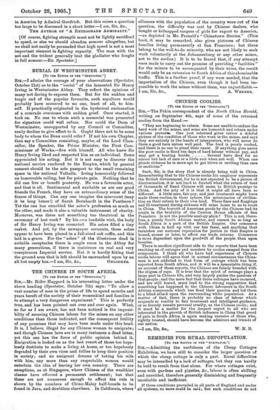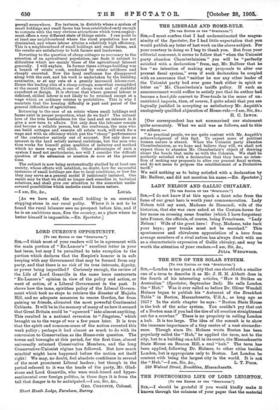SIR,— Admitting the usefulness of the Cheap Cottages Exhibition, we have
still to consider the larger question of which the cheap cottage is only a part. Rural difficulties may be intensified by a lack of cottages, but they can hardly
be held to result from that alone. For where cottages exist, even with gardens and pigsties, &c., labour is often shifting and unsettled, therefore generally diminishing and frequently unreliable and inefficient.
If these conditions prevailed in all parts of England and under all systems, no more could be said ; but such conditions do not
prevail everywhere. For instance, in districts where a system of small holdings and small farms has been established early enough to compete with the very obvious attractions which town employ- ment offers a very different state of things exists. I can point to at least one neighbourhood where the rural population has not diminished, and where labour attains a relatively high efficiency. This is a neighbourhood of small holdings and small farms, and the results are satisfactory to both farmer and landowner.
Reverting to the question of cheap cottages so necessary to the retention of an agricultural population, one finds it subject to difficulties which are mainly those of the agricultural interest generally. I will explain. In former times cottage-building was a branch of estate work, conducted by estate artificers and cheaply executed. Now the local craftsman has disappeared along with the rest, and his work is undertaken by the building contractor, or at any rate at a greatly increased labour-cost. Hence the leading idea of a cheap cottage, somewhat exemplified at the recent Exhibition, is one of cheap work and of doubtful expedient or design. It is obvious that where general labour is deficient, skilled labour is not likely to be retained except at a wage which on ordinary estates is prohibitive. This is why I maintain that the lousing difficulty is part and parcel of the general difficulties of agriculture.
Returning to the case of an estate where small holdings and farms' exist in proper proportion, what do we find ? The natural love of the true husbandman for the land and an interest in it give a new turn to affairs. Not only does the labourer remain and become a reliable person, but the craftsman, the man who can build cottages and execute all estate work, will work for a wage and with an efficiency which put the "cheap" performances of the contractor entirely out of account. Not only does an interest in the land satisfy natural ambitions, but the man who thus works for himself gains qualities of industry and method which no mere wage will elicit. Other advantages of such a system I need not particularise, nor will I consider the difficult question of its extension or creation de novo at the present time.
The subject is now being systematically studied by at least one society, whose efforts will establish, no doubt, how far successful instances of small holdings are due to local conditions, or how far they may serve as a general model if judiciously imitated. One result may be that we shall no longer seek remedies in technical solutions, and shall give our attention to the somewhat undis- covered possibilities which underlie rural human nature.
—I am, Sir, &c., LOCAL.
[As we have said, the small holding is an essential stepping-stone in our rural polity. Where it is not to be found the rural labourer sees no prospect before him, and if he is an ambitious man, flies the country, as a place where to better himself is impossible.—ED. Spectator.]



















































 Previous page
Previous page